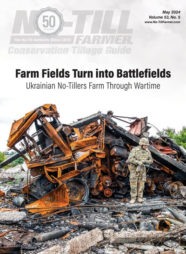If you’re no-tilling, the benefits of the practice may, in the long run, extend beyond what you see on your own farm — and you may have a significant advantage against your conventional-tillage neighbor.
BASF surveyed 2,100 farmers and 7,000 consumers in seven countries earlier this year about their attitudes and beliefs regarding sustainable farming.
Both groups indicated they “care about sustainability” (81% consumers, 78% of farmers), but they have a vastly different understanding of what sustainability means:
• Consumers often described sustainability as “environmentally friendly” or the “ability to produce sufficient food to feed the population.” Farmers were more specific, mentioning soil protection (40%), land use (27%), water use (27%) or biodiversity protection (25%) as parts of sustainability.
• While 82% of all farmers agreed that crop protection is used responsibly, only 37% of all consumers shared this view.
• Globally, 49% of farmers agree that there are currently “too many regulations are applied to the agricultural sector.” But 38% of consumers believe that “there aren’t enough regulations” in ag.
• When asked to evaluate current methods for food production in their countries, more than half of consumers (58%) are satisfied with the way farming is conducted.
So why should you care how consumers feel about the way you farm?
Because increasingly, they are your future customers, soil scientist and co-founder of Rhizoterra Jill Clapperton told farmers recently. She encouraged farmers to check out hipster Web sites, or ask their teenage children about them, to find out more.
“Those kids actually talk about where their food came from, what it’s like, and how organic it is,” Clapperton said. “These are the kids that you’re going to be selling to.
“There’s going to be more documentation about your food. Can you have a premium for quality food? Absolutely — and it’s just about developing the markets for that. Check out the Shepherd’s Grain website and you’ll see what quality, and marketing quality, is about.”
Shepherd’s Grain, based near Reardan, Wash., has nearly 60 growers raising wheat for them in southern Alberta, the Pacific Northwest and southern California. All use sustainable farming methods and are, or are becoming, certified as sustainable by a third-party audit.
The outside pressure for farmers to do their work more sustainably is likely to only increase. So no-tillers have two choices: Continue to grumble about it, or find a way to capitalize on it and enhance your bottom line.
By reducing tillage to conserve soil, adding cover crops, integrating livestock and using nutrients responsibly, you’ve already got a head start on many of your neighbors.







Post a comment
Report Abusive Comment